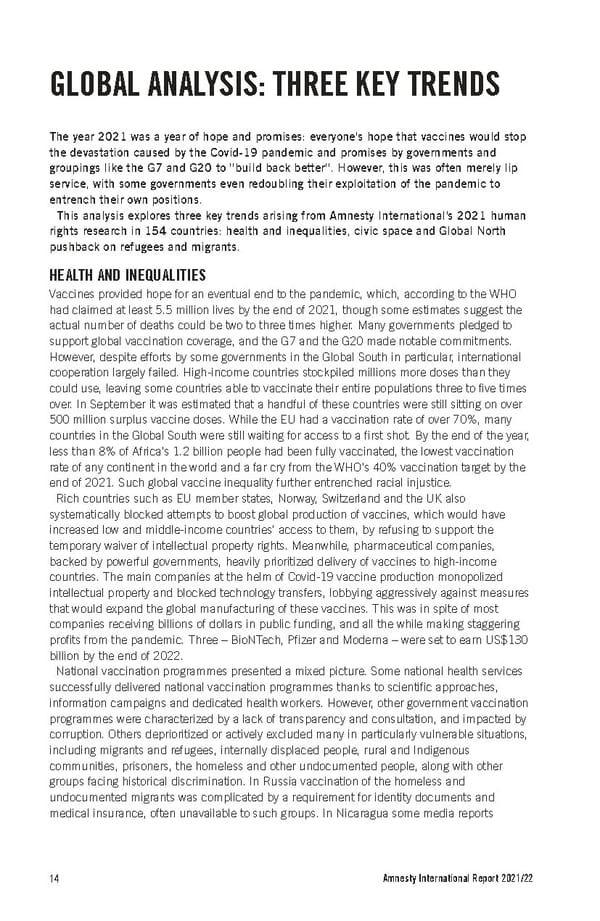GLOBAL ANALYSIS: THREE KEY TRENDS The year 2021 was a year of hope and promises: everyone’s hope that vaccines would stop the devastation caused by the Covid-19 pandemic and promises by governments and groupings like the G7 and G20 to “build back better”. However, this was often merely lip service, with some governments even redoubling their exploitation of the pandemic to entrench their own positions. This analysis explores three key trends arising from Amnesty International’s 2021 human rights research in 154 countries: health and inequalities, civic space and Global North pushback on refugees and migrants. HEALTH AND INEQUALITIES Vaccines provided hope for an eventual end to the pandemic, which, according to the WHO had claimed at least 5.5 million lives by the end of 2021, though some estimates suggest the actual number of deaths could be two to three times higher. Many governments pledged to support global vaccination coverage, and the G7 and the G20 made notable commitments. However, despite efforts by some governments in the Global South in particular, international cooperation largely failed. High-income countries stockpiled millions more doses than they could use, leaving some countries able to vaccinate their entire populations three to five times over. In September it was estimated that a handful of these countries were still sitting on over 500 million surplus vaccine doses. While the EU had a vaccination rate of over 70%, many countries in the Global South were still waiting for access to a first shot. By the end of the year, less than 8% of Africa’s 1.2 billion people had been fully vaccinated, the lowest vaccination rate of any continent in the world and a far cry from the WHO’s 40% vaccination target by the end of 2021. Such global vaccine inequality further entrenched racial injustice. Rich countries such as EU member states, Norway, Switzerland and the UK also systematically blocked attempts to boost global production of vaccines, which would have increased low and middle-income countries’ access to them, by refusing to support the temporary waiver of intellectual property rights. Meanwhile, pharmaceutical companies, backed by powerful governments, heavily prioritized delivery of vaccines to high-income countries. The main companies at the helm of Covid-19 vaccine production monopolized intellectual property and blocked technology transfers, lobbying aggressively against measures that would expand the global manufacturing of these vaccines. This was in spite of most companies receiving billions of dollars in public funding, and all the while making staggering profits from the pandemic. Three – BioNTech, Pfizer and Moderna – were set to earn US$130 billion by the end of 2022. National vaccination programmes presented a mixed picture. Some national health services successfully delivered national vaccination programmes thanks to scientific approaches, information campaigns and dedicated health workers. However, other government vaccination programmes were characterized by a lack of transparency and consultation, and impacted by corruption. Others deprioritized or actively excluded many in particularly vulnerable situations, including migrants and refugees, internally displaced people, rural and Indigenous communities, prisoners, the homeless and other undocumented people, along with other groups facing historical discrimination. In Russia vaccination of the homeless and undocumented migrants was complicated by a requirement for identity documents and medical insurance, often unavailable to such groups. In Nicaragua some media reports Amnesty International Report 2021/22 14
 Amnesty International Report 2021/22 Page 13 Page 15
Amnesty International Report 2021/22 Page 13 Page 15